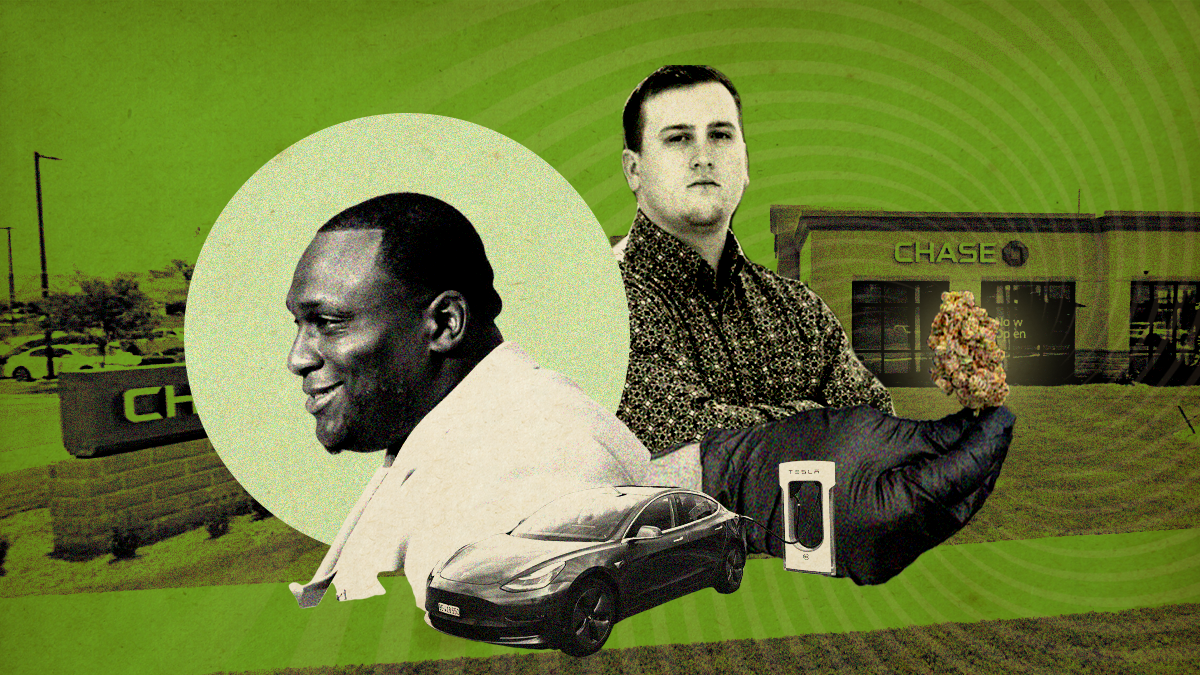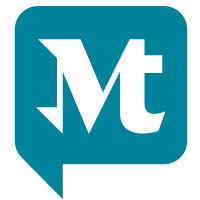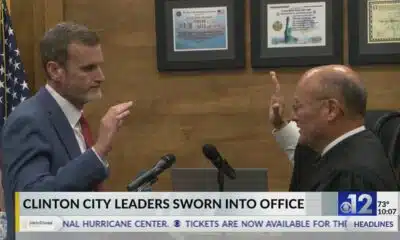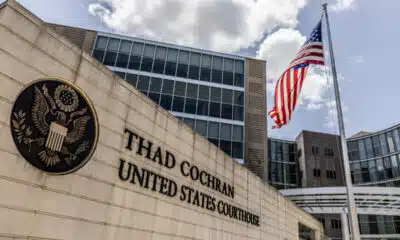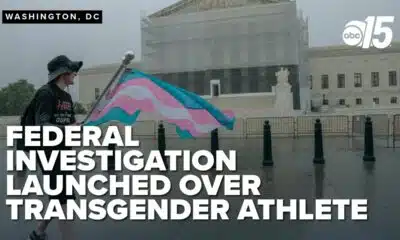Mississippi Today
‘He’s too good at lying not to do it’: Alleged conman claims former NFL defensive lineman and ‘gentle giant’ used ‘brute strength’ in kidnapping
‘He’s too good at lying not to do it’: Alleged conman claims former NFL defensive lineman and ‘gentle giant’ used ‘brute strength’ in kidnapping
A group of ill-advised businessmen and investors, including one of Mississippi’s own star athletes and former NFL player Jerrell Powe, were done being jerked around.
Several of them hopped on a conference call the afternoon of Wednesday, Jan. 11. On the line was a guy they call the ultimate con artist, 28-year-old Bryce Mathis.
Everyone on the phone agreed: Mathis owed them hundreds of thousands of dollars. Nearly a year of lies had finally caught up to him.
“We were all just like, ‘Look, we want our money back, Bryce. We want our money back,’” said Rob Howard, an investor in Mathis’ medical marijuana start-up and one of the individuals on the call. “And then he said, you know, ‘I just wanna make this right. I’m tired of doing all this stuff. I just wanna come clean and be done with this. It’s too stressful.’”
During the call, Mathis, Powe and a marijuana grower from California were traveling in a rented Tesla from the southeast Mississippi town of Laurel to the Chase Bank in Ridgeland, the Jackson suburb 100 miles away, where they said Mathis told them he’d stashed their money.
They arrived after the bank closed and decided to stay at a hotel in Pearl – near a Tesla charging station – so they could go first thing in the morning.
The next day, Ridgeland police officers arrested Powe and the grower, Gavin Bates, for allegedly kidnapping Mathis and taking him to withdraw the money against his will.
“If this case gets fully investigated, it’s going to turn out to be much different than what the police think it is,” said Powe’s attorney, Tom Fortner.
The funds in the Chase account weren’t enough to cover the debts. Several of the creditors believe the kidnapping allegation is just another one of Mathis’ clever stunts.
But Ridgeland Municipal Court prosecutor Boty McDonald said he has the written communication to prove the vigilante efforts of the aggrieved investors constitute a felony.
“The fact that someone may owe you money does not allow you to kidnap them to collect your debt,” McDonald said.
The alleged kidnappers apparently didn’t have any restraints, nor did they wield a weapon. Not a material one, anyway.
“Brute strength was the weapon,” McDonald said.
Mathis’ story goes that Powe – the 6-foot-2, 330-pound former nose tackle for the Ole Miss Rebels and later the NFL’s Kansas City Chiefs – slept on top of Mathis’ legs in the hotel bed to prevent him from escaping in the night.
“When this becomes a Netflix series, it’s going to be Apple Dumpling Gang meets The Sopranos,” McDonald said.
Mathis, owner of a number of LLCs including Endless Esports, Endless Media and Chickasawhay Medical, the marijuana startup, is an Air Force veteran-turned-entrepreneur from Waynesboro, Mississippi, according to his online profiles. His primary business, Endless Holdings LLC, is not filed as a company in Mississippi.
“I believe that relationships are at the core of new ventures and have built a reputation of building meaningful connections resulting in a network of people with endless opportunity,” Mathis wrote on his Forbes Council profile.
Powe, 35, is from Buckatunna, another small town in Wayne County. The NCAA infamously denied the athlete, who was described as learning-disabled, eligibility to play at University of Mississippi three separate times – resulting in claims of discrimination against the association. He was drafted to the Kansas City Chiefs in 2011 and finished his college degree in 2018. People that know him describe Powe as a “gentle giant,” a shirt-off-his-back kind of guy, but in the media, his career has been marked by exaggerated claims that he can’t read and, now, kidnapping allegations.
Last year, despite the warnings from friends, Powe entered into business with Mathis, handing over an investment of $300,000 from him and other friends and athletes.
For the last few years, according to interviews Mississippi Today conducted with nine of his former associates, Mathis’ MO has gone something like this:
Mathis meets potential investors and pitches them on a business venture — anything from an oilfield services company; to a video gamer influencer brand; to a new medical marijuana grow facility near his tiny hometown in Wayne County.
“The kid’s a very good talker,” said Mark Amador, owner of an oil drilling company in Midland, Texas.
He takes their money — $50,000, $200,000 or $300,000 investments — and then the fun begins. Trips to California, rooms at the Four Seasons in Beverly Hills, Wagyu beef dinners, shopping sprees at Best Buy, to name a few.
“I worked hard for my $50,000 and when I give him my $50,000, he magically went to Hawaii two weeks later. Wonder how he got that money,” one of the investors who did not want to be named told Mississippi Today.
To dodge the people expecting quarterly dividends or salaries from him, Mathis would act like he was going to send them the money but then provide some vague excuse: the bank was closed, the wire didn’t go through, Venmo doesn’t work, or he went to the bank but there was a problem with his revolving credit account.
“It was always messed up, always not open or some crap,” said another former associate.
One time, after promising to pay for a business trip to Los Angeles, the former associate said Mathis gave him a flimsy Regions debit card to use on expenses. It declined every time. Another time, Mathis had Amador physically waiting at a bank for hours for a payment that never came. “I looked like an idiot,” he said.
“It’s always the same story,” Howard said.
To solve these problems, one of the consultants on Mathis’ Esports venture opened a bank account at Chase Bank that he could monitor. But he said Mathis used the same tricks not to wire the seed money into the account. The only transfer Mathis made into the account was for 40 cents, the consultant told Mississippi Today.
Over the past year, multiple people have left jobs to work for Mathis’ startups but were never paid, multiple sources said. One of the employees didn’t have money to buy his kids Christmas gifts this past year.
To keep each of his investors and employees from talking to each other and detecting his inconsistencies, they said Mathis bred distrust, fabricating disparaging remarks they’d said about each other.
Once they finally all connected and the jig was up, Mathis claimed one of his employees, the one who set up the Chase account, was connected to the drug cartel and that if he saw Mathis take out the money, the guy would kill his family.
Mathis’ alleged schemes never seem to take into account what will happen beyond the present moment. In an August column Mathis submitted as part of a subscription with Forbes Council, he wrote about how entrepreneurs can enjoy the “here and now,” about how “the time for happiness is today, not tomorrow.”
“Why is entrepreneurship so difficult?” he wrote. “Why does it seem that odds are perpetually stacked against you, and your own happiness is under attack? … You might say, ‘It’s me against the world,’ and while that might be true for some, you’ll likely learn along the way that this sort of excessive individualism can lead to even bigger challenges.”
Mathis did not respond to Mississippi Today’s text to a number provided for him or an inquiry on Twitter.
Mississippi Today spoke with more than half a dozen people who said Mathis either owed them money or failed to make promised investments. By their own tally, they estimate Mathis could owe a combined $1.2 million. In some cases, Mathis paid back his creditors, but only after they put immense pressure on Mathis, and even then, the money came from another individual.
“I threatened him with an ass whooping,” said yet another man, a contractor who eventually received a check, not from Mathis but another business partner, months after completing work for him.
That story echoes charges Mathis faced in Covington County for defrauding Rutland Lumber Co. of $66,000 worth of lumber in 2017. A statement of fact filed in court states that after delivering the lumber, a salesman for the company had to contact Mathis repeatedly to get payment. Mathis told him he could pick up the checks at his office in Hattiesburg, but when the salesman got there, there was no office at the address. Finally, Mathis forked over the checks, but they either bounced or the bank account was closed.
A grand jury indicted Mathis for false pretenses and mail fraud in 2019, but the charges were dropped — what’s called a nolle pros — after Mathis paid what he owed, court records show.
The people who have fallen for Mathis’ alleged scams come from all over the country — west Texas, Los Angeles, Seattle, south Florida, Pennsylvania. They all say the same thing: Bryce Mathis is not to be trusted.
“The details are truly unbelievable, I nearly got entangled in a $20 million cannabis related fraud, he has played a significantly damaging role in a number of people’s lives,” one of Bryce’s prospective business partners, Daniel Kauffman, wrote in an email to a reporter at Bloomberg last May. “I suspect he will successfully continue unless exposed, Bryce simply cannot help himself. He’s too good at lying not to do it.”
But when officers arrived at Chase Bank in Ridgeland on Jan. 12 – after Mathis told a teller that Powe had kidnapped him – they took the alleged conman’s word for it.
Powe was inside the bank during the alleged abduction, playing on Snapchat on his cellphone. The athlete told police his side of the story — that Mathis agreed to go to the bank to retrieve their money — but Fortner, the lawyer, said the officers “blindly accepted” Mathis’ version.
Officers arrested Powe and Bates, who was waiting in the Tesla during the incident, at the bank that Thursday. The pair remained in jail until a judge set bail, $100,000 a piece, and they each bonded out on Tuesday.
A couple days later, U.S. Marshals arrested another investor in the marijuana company, a Texas woman named Angie McLelland, on a fugitive warrant for conspiracy related to the alleged kidnapping. Later that night, officers also arrested an attorney close to Powe, Cooper Leggett, for conspiracy. Leggett is the counsel for the Wayne County Board of Supervisors, which was involved in helping launch the marijuana venture.
“That shows you what the Ridgeland Police Department is thinking,” Fortner said, “that anything this Bryce guy says, they’re acting on that, they’re trusting that, and that may be a real problem here.”
Other than Mathis’ account, Assistant Police Chief Tony Willridge declined to tell Mississippi Today what other evidence it used as the basis of the arrests, citing the ongoing investigation.
But McDonald said the backbone of their case, which they’re turning over to the Madison County District Attorney’s Office, “does not come from the mouth of Bryce.”
“It is based on what they all said and typed and texted,” McDonald said. “… It continues to amaze me what people will put in text messages and emails and voice messages.”
He declined to go into further detail. The case has not yet been presented to a grand jury.
Howard, from Pennsylvania, told Mississippi Today that Mathis had also invited him to come to Mississippi a few days before the alleged kidnapping so Mathis could give him a certified check. Howard had traveled to Mississippi twice before and both times, Mathis failed to hand over the money, so Howard refused to come this time.
“He told me to come down multiple times, ‘And we’ll go to the bank,’” Howard said. “… Was he trying to set me up too, get me to come down and get me wrapped up on all that stuff too? Like what was his plan?”
Mississippi Today spoke with five people who were on the Jan. 11 conference call. Each corroborated that Mathis said he wanted to go to the bank to settle up with them.
“Bryce said he’ll go over there and get this straight. He said too many people is getting pissed off and everything like that,” said Wade Lowery, one of the men on the call. “…That was the last I heard when I got off that phone and the next thing I know, they’ve got his (Powe’s) mugshot.”
Powe’s arrest appeared on many of the major news sites, as well as ESPN and Sports Illustrated.
The news story, like most in Mississippi, can’t escape race. The arrest itself occurred in a suburban area north of Jackson, in a county that was embroiled in racial profiling lawsuit not long ago.
Lowery painted a picture of the scene: “Before the TV cameras and all that, we already knew what had happened. He (Mathis) got to the bank and told them that he was getting kidnapped, you know, a white man coming in there with a black man. Of course. There we go. ‘He threatened to kill me, he’s kidnapping me,’ this and that, and there you go,” Lowery said. “That’s not the type of person Jerrell Powe is.”
“I think that the kidnapping shit was just another way for him (Mathis) not to pay nobody,” he added.
Now, most of Mathis’ former associates believe he’s fled Mississippi. They say he’s been using a blocked phone number. McDonald said he believes Mathis is in fear for his life and has good reason to be.
“He frauded them (the bank employees) and frauded the police department and just slipped out of the noose, so now he’s on the run, and it’s just a big mess,” said Angie McLelland’s husband, Colburn McClelland.
Another investor David Hensley concurred: “I think that was a smoke and mirrors to stop the questioning of Bryce and give him enough time to leave the area so his little secret wouldn’t be found out. He’s very creative.”
Another one of Mathis’ purported companies is Mathis Trading, a building materials supplier. Hensley said he bought thousands of dollars worth of metals from Mathis, but the goods never arrived. The fictitious truck driver pretended to get lost on his way to his company in Pennsylvania.
Hensley said he turned over the information to his local law enforcement and they are currently investigating Mathis.
“We’re not here to strong-arm people … We’re not a bunch of gangsters out here trying to get illegal money or illegal investments,” Hensley said. “We’re just hard-working American people and providing work for a lot of other families. Then you have a guy like this who comes along and tries to scam us.”
This article first appeared on Mississippi Today and is republished here under a Creative Commons license.
Did you miss our previous article…
https://www.biloxinewsevents.com/?p=204965
Mississippi Today
Trump nominates Baxter Kruger, Scott Leary for Mississippi U.S. attorney posts
President Donald Trump on Tuesday nominated Baxter Kruger to become Mississippi’s new U.S. attorney in the Southern District and Scott Leary to become U.S. attorney for the Northern District.
The two nominations will head to the U.S. Senate for consideration. If confirmed, the two will oversee federal criminal prosecutions and investigations in the state.
Kruger graduated from the Mississippi College School of Law in 2015 and was previously an assistant U.S. attorney for the Southern District. He is currently the director of the Mississippi Office of Homeland Security.
Sean Tindell, the Mississippi Department of Public Safety commissioner, oversees the state’s Homeland Security Office. He congratulated Kruger on social media and praised his leadership at the agency.
“Thank you for your outstanding leadership at the Mississippi Office of Homeland Security and for your dedicated service to our state,” Tindell wrote. “Your hard work and commitment have not gone unnoticed and this nomination is a testament to that!”
Leary graduated from the University of Mississippi School of Law, and he has been a federal prosecutor for most of his career.
He worked for the U.S. Attorney’s Office in the Western District of Tennessee in Memphis from 2002 to 2008. Afterward, he worked at the U.S. Attorney’s Office for the Northern District of Mississippi in Oxford, where he is currently employed.
Leary told Mississippi Today that he is honored to be nominated for the position, and he looks forward to the Senate confirmation process.
This article first appeared on Mississippi Today and is republished here under a Creative Commons Attribution-NoDerivatives 4.0 International License.
The post Trump nominates Baxter Kruger, Scott Leary for Mississippi U.S. attorney posts appeared first on mississippitoday.org
Note: The following A.I. based commentary is not part of the original article, reproduced above, but is offered in the hopes that it will promote greater media literacy and critical thinking, by making any potential bias more visible to the reader –Staff Editor.
Political Bias Rating: Centrist
This article presents a straightforward news report on President Donald Trump’s nominations of Baxter Kruger and Scott Leary for U.S. attorney positions in Mississippi. It focuses on factual details about their backgrounds, qualifications, and official responses without employing loaded language or framing that favors a particular ideological perspective. The tone is neutral, with quotes and descriptions that serve to inform rather than persuade. While it reports on a political appointment by a Republican president, the coverage remains balanced and refrains from editorializing, thus adhering to neutral, factual reporting.
Mississippi Today
Jackson’s performing arts venue Thalia Mara Hall is now open
After more than 10 months closed due to mold, asbestos and issues with the air conditioning system, Thalia Mara Hall has officially reopened.
Outgoing Mayor Chokwe A. Lumumba announced the reopening of Thalia Mara Hall during his final press conference held Monday on the arts venue’s steps.
“Today marks what we view as a full circle moment, rejoicing in the iconic space where community has come together for decades in the city of Jackson,” Lumumba said. “Thalia Mara has always been more than a venue. It has been a gathering place for people in the city of Jackson. From its first class ballet performances to gospel concerts, Thalia Mara Hall has been the backdrop for our city’s rich cultural history.”
Thalia Mara Hall closed last August after mold was found in parts of the building. The issues compounded from there, with malfunctioning HVAC systems and asbestos remediation. On June 6, the Mississippi State Fire Marshal’s Office announced that Thalia Mara Hall had finally passed inspection.
“We’re not only excited to have overcome many of the challenges that led to it being shuttered for a period of time,” Lumumba said. “We are hopeful for the future of this auditorium, that it may be able to provide a more up-to-date experience for residents, inviting shows that people are able to see across the world, bringing them here to Jackson. So this is an investment in the future.”
In total, Emad Al-Turk, a city contracted engineer and owner of Al-Turk Planning, estimates that $5 million in city and state funds went into bringing Thalia Mara Hall up to code.
The venue still has work to be completed, including reinstalling the fire curtain. The beam in which the fire curtain will be anchored has asbestos in it, so it will have to be remediated. In addition, a second air-conditioning chiller needs to be installed to properly cool the building. Until it’s installed, which could take months, Thalia Mara Hall will be operating at a lower seating capacity of about 800.
“Primarily because of the heat,” Al-Turk said. “The air conditioning would not be sufficient to actually accommodate the 2,000 people at full capacity, but starting in the fall, that should not be a problem.”
Al-Turk said the calendar is open for the city to begin booking events, though none have been scheduled for July.
“We’re very proud,” he said. “This took a little bit longer than what we anticipated, but we had probably seven or eight different contractors we had to coordinate with and all of them did a superb job to get us where we are today.”
This article first appeared on Mississippi Today and is republished here under a Creative Commons Attribution-NoDerivatives 4.0 International License.
The post Jackson’s performing arts venue Thalia Mara Hall is now open appeared first on mississippitoday.org
Note: The following A.I. based commentary is not part of the original article, reproduced above, but is offered in the hopes that it will promote greater media literacy and critical thinking, by making any potential bias more visible to the reader –Staff Editor.
Political Bias Rating: Centrist
The article presents a straightforward report on the reopening of Thalia Mara Hall in Jackson, focusing on facts and statements from city officials without promoting any ideological viewpoint. The tone is neutral and positive, emphasizing the community and cultural significance of the venue while detailing the challenges overcome during renovations. The coverage centers on public investment and future prospects, without partisan framing or editorializing. While quotes from Mayor Lumumba and a city engineer highlight optimism and civic pride, the article maintains balanced, factual reporting rather than advancing a political agenda.
Mississippi Today
‘Hurdles waiting in the shadows’: Lumumba reflects on challenges and triumphs on final day as Jackson mayor
On his last day as mayor of Jackson, Chokwe Antar Lumumba recounted accomplishments, praised his executive team and said he has no plans to seek office again.
He spoke during a press conference outside of the city’s Thalia Mara Hall, which was recently cleared for reopening after nearly a year of remediation. The briefing, meant to give media members a peek inside the downtown theater, marked one of Lumumba’s final forays as mayor.
Longtime state Sen. John Horhn — who defeated Lumumba in the Democratic primary runoff — will be inaugurated as mayor Tuesday, but Lumumba won’t be present. Not for any contentious reason, the 42-year-old mayor noted, but because he returns to his private law practice Tuesday.
“I’ve got to work now, y’all,” Lumumba said. “I’ve got a job.”
Thalia Mara Hall’s presumptive comeback was a fitting end for Lumumba, who pledged to make Jackson the most radical city in America but instead spent much of his eight years in office parrying one emergency after another. The auditorium was built in 1968 and closed nearly 11 months ago after workers found mold caused by a faulty HVAC system – on top of broken elevators, fire safety concerns and vandalism.
“This job is a fast-pitched sport,” Lumumba said. “There’s an abundance of challenges that have to be addressed, and it seems like the moment that you’ve gotten over one hurdle, there’s another one that is waiting in the shadows.”
Outside the theater Monday, Lumumba reflected on the high points of his leadership instead of the many crises — some seemingly self-inflicted — he faced as mayor.
He presided over the city during the coronavirus pandemic and the rise in crime it brought, but also the one-two punch of the 2021 and 2022 water crises, exacerbated by the city’s mismanagement of its water plants, and the 18-day pause in trash pickup spurred by Lumumba’s contentious negotiations with the city council in 2023.
Then in 2024, Lumumba was indicted alongside other city and county officials in a sweeping federal corruption probe targeting the proposed development of a hotel across from the city’s convention center, a project that has remained stalled in a 20-year saga of failed bids and political consternation.
Slated for trial next year, Lumumba has repeatedly maintained his innocence.
The city’s youngest mayor also brought some victories to Jackson, particularly in his first year in office. In 2017, he ended a furlough of city employees and worked with then-Gov. Phil Bryant to avoid a state takeover of Jackson Public Schools. In 2019, the city successfully sued German engineering firm Siemens and its local contractors for $89 million over botched work installing the city’s water-sewer billing infrastructure.
“I think that that was a pivotal moment to say that this city is going to hold people responsible for the work that they do,” Lumumba said.
Lumumba had more time than any other mayor to usher in the 1% sales tax, which residents approved in 2014 to fund infrastructure improvements.
“We paved 144 streets,” he said. “There are residents that still are waiting on their roads to be repaved. And you don’t really feel it until it’s your street that gets repaved, but that is a significant undertaking.”
And under his administration, crime has fallen dramatically recently, with homicides cut by a third and shootings cut in half in the last year.
Lumumba was first elected in 2017 after defeating Tony Yarber, a business-friendly mayor who faced his own scandals as mayor. A criminal justice attorney, Lumumba said he never planned to seek office until the stunning death of his father, Chokwe Lumumba Sr., eight months into his first term as mayor in 2014.
“I can say without reservation, and unequivocally, we remember where we started. We are in a much better position than we started,” Lumumba said.
Lumumba said he has sat down with Horhn in recent months, answered questions “as extensively as I could,” and promised to remain reachable to the new mayor.
This article first appeared on Mississippi Today and is republished here under a Creative Commons Attribution-NoDerivatives 4.0 International License.
The post 'Hurdles waiting in the shadows': Lumumba reflects on challenges and triumphs on final day as Jackson mayor appeared first on mississippitoday.org
Note: The following A.I. based commentary is not part of the original article, reproduced above, but is offered in the hopes that it will promote greater media literacy and critical thinking, by making any potential bias more visible to the reader –Staff Editor.
Political Bias Rating: Center-Left
The article reports on outgoing Jackson Mayor Chokwe Antar Lumumba’s reflections without overt editorializing but subtly frames his tenure within progressive contexts, emphasizing his self-described goal to make Jackson “the most radical city in America.” The piece highlights his accomplishments alongside challenges, including public crises and a federal indictment, maintaining a factual tone yet noting contentious moments like labor disputes and governance issues. While it avoids partisan rhetoric, the focus on social justice efforts, infrastructure investment, and crime reduction, as well as positive framing of Lumumba’s achievements, aligns with a center-left perspective that values progressive governance and accountability.
-
Mississippi Today6 days ago
Defendant in auditor’s ‘second largest’ embezzlement case in history goes free
-
News from the South - Georgia News Feed5 days ago
Are you addicted to ‘fridge cigarettes’? Here’s what the Gen Z term means
-
The Conversation6 days ago
Toxic algae blooms are lasting longer than before in Lake Erie − why that’s a worry for people and pets
-
News from the South - Tennessee News Feed6 days ago
5 teen boys caught on video using two stolen cars during crash-and-grab at Memphis gas station
-
News from the South - Kentucky News Feed7 days ago
Error that caused Medicaid denials has been corrected, says cabinet in response to auditor letter
-
News from the South - Georgia News Feed7 days ago
GOP mega-bill stuck in US Senate as disputes grow over hospitals and more
-
News from the South - South Carolina News Feed5 days ago
Federal investigation launched into Minnesota after transgender athlete leads team to championship
-
Local News6 days ago
St. Martin trio becomes the first females in Mississippi to sign Flag Football Scholarships
